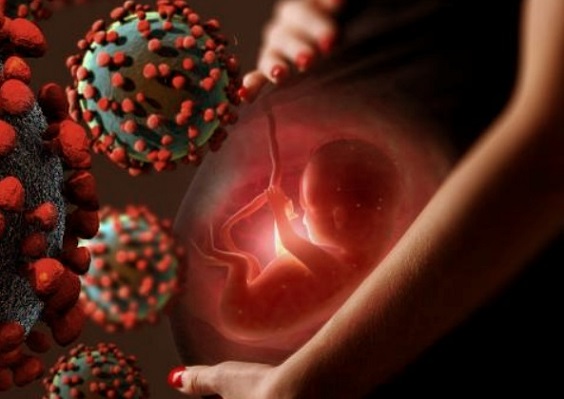COVID-19 Infection During Pregnancy Alters Placental Genes and May Raise Risks for the Baby
Nikhil Prasad Fact checked by:Thailand Medical News Team May 17, 2025 9 months, 1 week, 22 hours, 18 minutes ago
Medical News: A new study conducted by researchers from the University Hospital of the Ludwig-Maximilian-University (LMU) Munich has uncovered concerning evidence that SARS-CoV-2 infection during pregnancy can lead to epigenetic changes in the placenta. These changes, which affect how genes are turned on or off, may contribute to complications in pregnancy and fetal development.
 COVID-19 Infection During Pregnancy Alters Placental Genes and May Raise Risks for the Baby
COVID-19 Infection During Pregnancy Alters Placental Genes and May Raise Risks for the Baby
The research team, comprising Franziska Ganster, Friederike Kallenberg, Anna Titova, Laura Hahn, Susanne Beyer, Mirjana Kessler, Thomas Kolben, Sven Mahner, and Sarah Meister, analyzed placental tissues from women who were infected with COVID-19 during pregnancy. Their work focused on two specific types of chemical tags found on proteins called histones—namely H3K4me3 and H3K9ac—which help regulate gene activity.
This
Medical News report brings to light the serious possibility that these molecular alterations could impair how the placenta supports the growing fetus, particularly by affecting genes responsible for proper cell function, nutrient transport, and immune protection.
Understanding the Placenta’s Molecular Makeup
The placenta is vital for a successful pregnancy. It not only provides oxygen and nutrients to the baby but also acts as a protective barrier. The function of the placenta depends on how genes are expressed, which is controlled in part by histone modifications. These modifications are like biological switches that tell genes when to be active or inactive.
In this study, the team collected placental samples from four groups of women: those who were unvaccinated and healthy, those vaccinated and healthy, those infected with SARS-CoV-2 during pregnancy, and those infected during childbirth. Advanced staining techniques were used to measure levels of H3K4me3 (a marker linked to active genes) and H3K9ac (another marker linked to open, accessible DNA).
The results were striking. Women who had COVID-19 during pregnancy had significantly lower levels of both histone markers compared to healthy controls. This drop was most pronounced in a region of the placenta known as the syncytiotrophoblast, which is crucial for nutrient exchange between mother and baby. The decidua, the maternal part of the placenta, also showed reduced levels of these histone modifications.
Interestingly, even though vaccination did show some effect on these markers, the reduction caused by actual infection was more severe.
A Shift Toward Gene Silencing Raises Red Flags
When histone modifications like H3K4me3 and H3K9ac are reduced, it can lead to what's known as a "repressive chromatin state." In simpler terms, this means that important genes may become silent or inactive. These silenced genes include those involved in placenta formation, immune regulation, and even fetal growth.
The researchers found that the virus appear
s to stimulate an increase in enzymes called histone deacetylases (HDACs). These enzymes remove acetyl groups from histones, shutting down gene activity. This effect was seen alongside increased numbers of immune cells (macrophages) in the placenta, pointing to an inflammatory response likely triggered by the virus.
These combined factors may disturb the delicate balance required for a healthy pregnancy. As such, these findings could explain why some pregnant women with COVID-19 are more likely to experience issues like high blood pressure, poor fetal growth, or even preterm birth.
Gender and Age Not Significant Factors in Histone Changes
The study also investigated whether the sex of the baby or the mother’s age had any influence on these histone modifications. The researchers found no significant differences, suggesting that the observed changes were directly linked to SARS-CoV-2 infection rather than demographic factors.
Double Testing Confirms the Findings
To verify their results, the team also performed a second type of analysis using immunofluorescence, which allows researchers to visually track these markers under a special microscope. This confirmed that both histone markers were lower in COVID-affected placentas, while immune cell markers were elevated. The consistency between both methods adds strength to the study’s conclusions.
Why This Study Matters
This research highlights a less-discussed consequence of COVID-19 in pregnancy—the disruption of gene regulation in the placenta. The placenta is not just a passive organ; it is dynamically involved in ensuring the baby’s development. Any disturbance to its molecular environment, especially involving gene silencing, could have downstream effects on fetal health that last even after birth.
These findings suggest that monitoring pregnant women who contract COVID-19 could be crucial, even if they seem to recover from the infection. It may also pave the way for future treatments that focus on correcting or protecting against such epigenetic changes.
Conclusion
This study underscores a new and alarming dimension to COVID-19's impact on pregnancy. The virus not only causes respiratory symptoms but also reaches deep into the biological core of pregnancy, altering gene regulation in the placenta. These changes could have long-lasting effects on both mother and child, increasing risks of complications like preeclampsia, intrauterine growth restriction, or premature birth. The research makes it clear that SARS-CoV-2 is not a virus to be taken lightly during pregnancy and calls for further studies into how these epigenetic disruptions can be detected early and possibly prevented.
Moving forward, healthcare providers may need to monitor placental health more closely in expecting mothers with a history of COVID-19, and researchers may explore therapies that target histone-modifying enzymes to protect against adverse pregnancy outcomes.
The study findings were published on a preprint server and are currently being peer reviewed.
https://www.preprints.org/manuscript/202505.0969/v1
For the latest COVID-19 News, keep on logging to Thailand
Medical News.
Read Also:
https://www.thailandmedical.news/news/swedish-study-finds-that-mild-covid-19-in-pregnant-mothers-alters-babies-genes-and-impacts-long-term-health
https://www.thailandmedical.news/news/covid-19-news-study-shows-that-exposure-to-sars-cov-2-during-pregnancy-results-in-newborns-developing-epigenetic-changes
https://www.thailandmedical.news/news/breaking-news-covid-19-exposure-during-pregnancy-leads-to-epigenetic-changes-in-newborns,-paving-the-way-for-health-issues-later-in-life
https://www.thailandmedical.news/articles/coronavirus
https://www.thailandmedical.news/pages/thailand_doctors_listings
